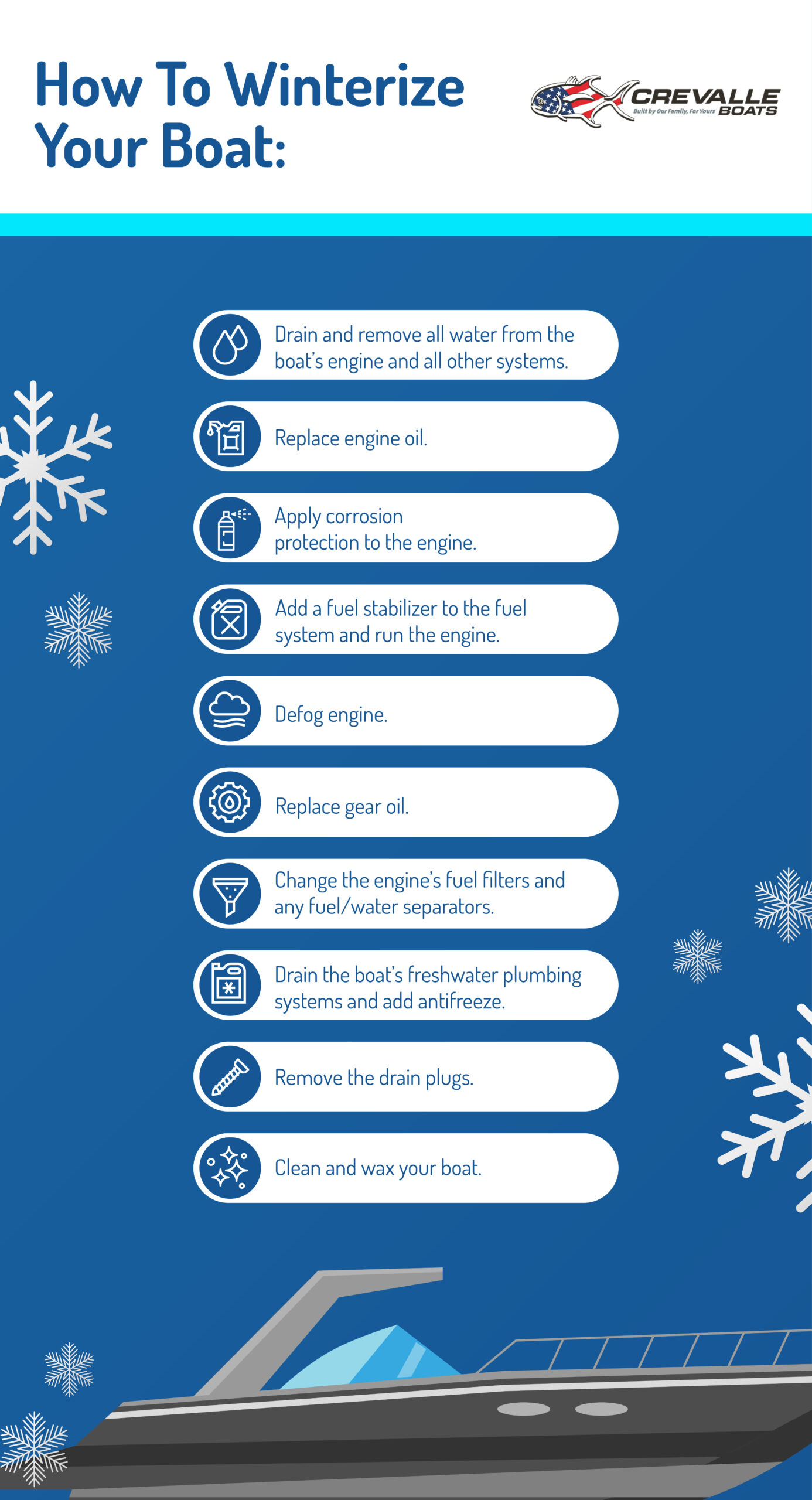Fall is here, and the cold weather is approaching. If you haven’t done so already, it may be time to winterize your boat. Winterizing your boat essentially means draining your boat of any water aboard or replacing it with antifreeze to protect against extreme cold temperatures and storing it for the cold months. If you’re not using your family-friendly fishing boat year-round, it’s important to protect your boat so it’s safe and ready to enjoy when spring arrives.
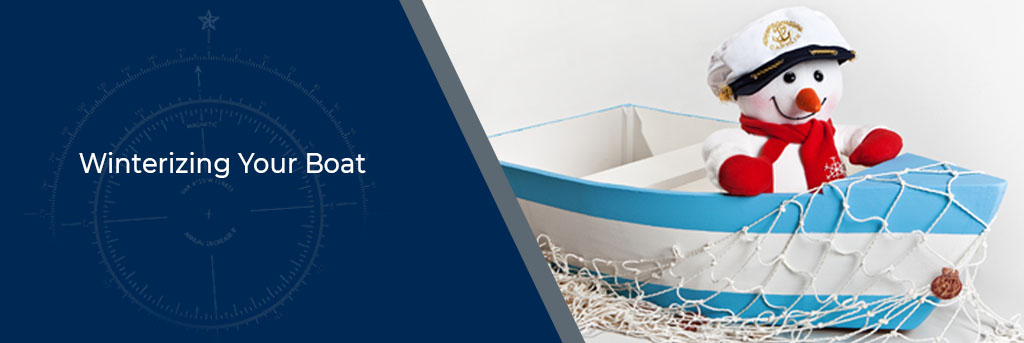
Do you have to winterize your boat?
Yes. You should absolutely winterize your boat. Your boat is a big investment, not just a financial one. Think of all the time you spend enjoying your boat and the effort you put into taking care of it. Do what you can to preserve it so you can make more memories.
While you may think you don’t need to winterize your boat if you live in a state with more seasonable temperatures during the winter months, that is not the case. According to GEICO BoatUS Marine insurance claims, Texas, which tends to have a warmer climate is the top state for winterizing related boat insurance claims. Florida, home to Crevalle boat manufacturers, had more winterizing claims than Minnesota, which tends to have a colder climate. BoatUS suggests that residents in the colder states know that they should winterize their boat, whereas boaters in the warmer states feel it is less of a necessity. Claim data for the past 10 years shows that more than half of the top 10 states for freezing claims can be considered warm-weather states.
No matter where you live, you should have some type of plan in place for protecting your boat during the winter months.
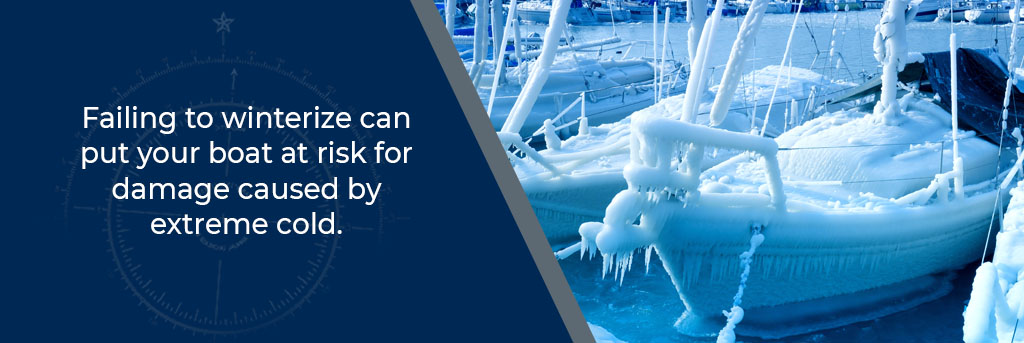
At what temperature do you start winterizing your boat?
When to winterize your boat can be a difficult decision. As an avid boater, you want to get the most out of the boating season as possible, but you don’t want to wait too long. Unwinterized boat engines can freeze any time the air temperature is below 28°F for an extended period of time. Freshwater cooled engines without proper coolant can freeze when temperatures dip below 32°F.
While an unexpected overnight frost may not freeze your engine, you should aim to start winterizing your boat well before 32 degrees is in the five-day forecast. If you live in a climate with chilly or seasonable fall temperatures, aim to winterize your boat in September to be on the safe side. Boaters living in warmer climates may be able to wait another few more weeks and winterize their boats in mid-October.
Set a date or week to prepare your boat for the winter. Create and stick to a yearly schedule or target, such as right after labor, or the last week of September, or the first weekend in October. When you have a set routine, you’re less likely to forget and risk being caught off guard by a surprise frost.
If you really want to maximize boating season, the Farmer’s Almanac and the National Oceanic and Atmospheric Administration (NOAA) provide regional frost data to help you determine when is the best time to winterize your boat. Remember to leave yourself some extra time to get any necessary maintenance before you start winterizing your boat.
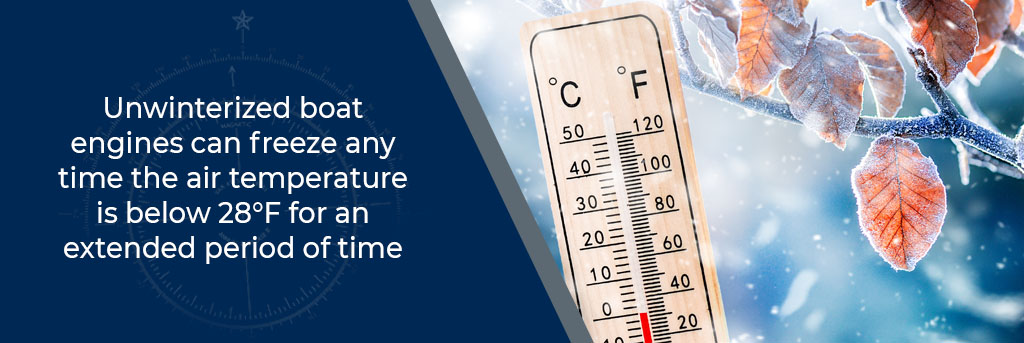
What can happen if you don’t winterize your boat?
Failing to winterize your boat, can put your vessel at risk for damage caused by extremely cold temperatures. Water droplets left on a boat during the cold weather can freeze, expand by about 9%, and push outward with the force of tens of thousands of pounds per square inch. This expansion can cause cracks in the engine, split hoses, damage fiberglass, or ruin a refrigeration system. More than three-quarters of freeze claims in the past 10 years involved cracks in the engine blocks or exhaust manifolds caused by water left behind in the engine or cooling system.
In addition to freeze damage, water left on the boat can also cause mold and mildew growth and lead to corrosion. Failing to winterize your boat can prevent you from enjoying it when spring arrives. The time and money spent to repair freeze and other water damage can be a headache. The time spent winterizing your boat, or the money spent hiring someone to winterize your boat can be relatively small compared to the potential damage caused by failing to winterize your boat.
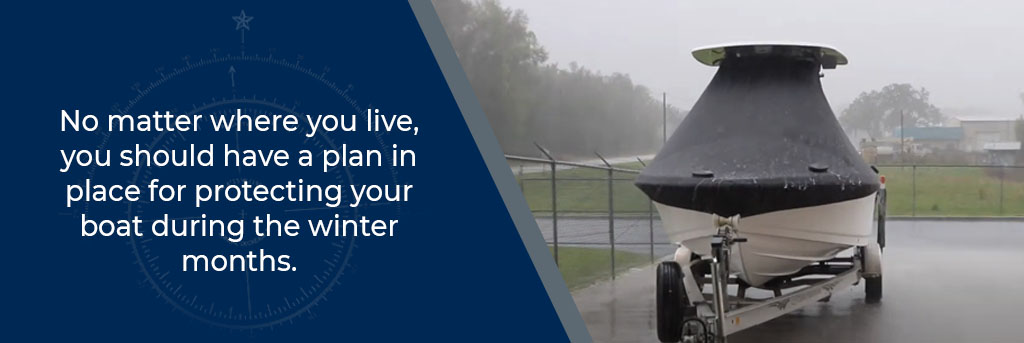
How to winterize your boat
One of the most important things when storing your boat is to ensure that it is covered. Purchasing a storage cover for your boat is a great investment. Custom covers are available for the Crevalle 24-foot hybrid crossover bay boat, 26-foot hybrid crossover bay boat, 26-foot hybrid blue water, and 33-foot sportfishing boat. Learn more about covering and storage in Spring Cleaning Your Boat.
There are several important maintenance tasks that you should complete before covering and storing your boat for the winter. Prepare your boat for the cold with this boat winterization checklist:
- Drain and remove all water from the boat’s engine and all other systems (raw water washdowns, live wells, bilge pump, etc.).
- Replace engine oil.
- Apply corrosion protection to the engine.
- Add a fuel stabilizer to the fuel system and run the engine.
- Defog engine.
- Replace gear oil.
- Change the engine’s fuel filters and any fuel/water separators.
- Drain the boat’s freshwater plumbing systems and add antifreeze.
- Remove the drain plugs.
- Clean and wax your boat.
All boats are different, so you should consult your owner’s manual for the proper way to complete the above tasks.
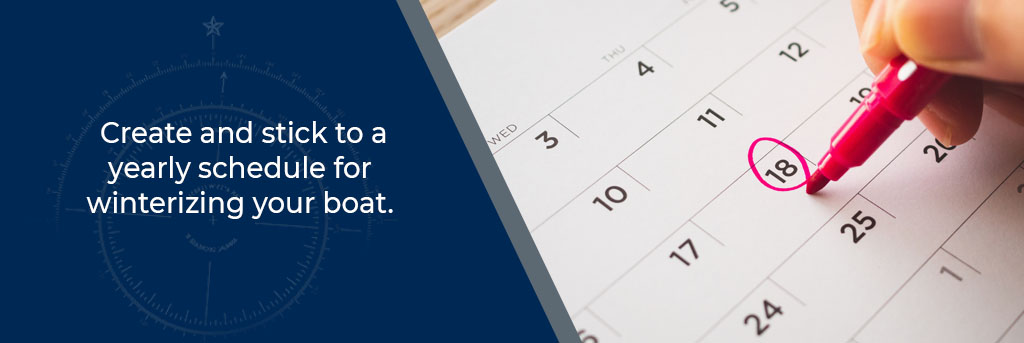
Enjoy your boat for years to come
Boating isn’t just a hobby, it’s a lifestyle. Whether you’re enjoying your boat for fishing excursions or family fun, winterizing your boat is key to making your boat last for years to come. Register your boat with Crevalle for our warranty program and consult your owner’s manual for the proper ways to care for your Crevalle hybrid bay boat. You can also contact us with any questions about caring for your Crevalle.
